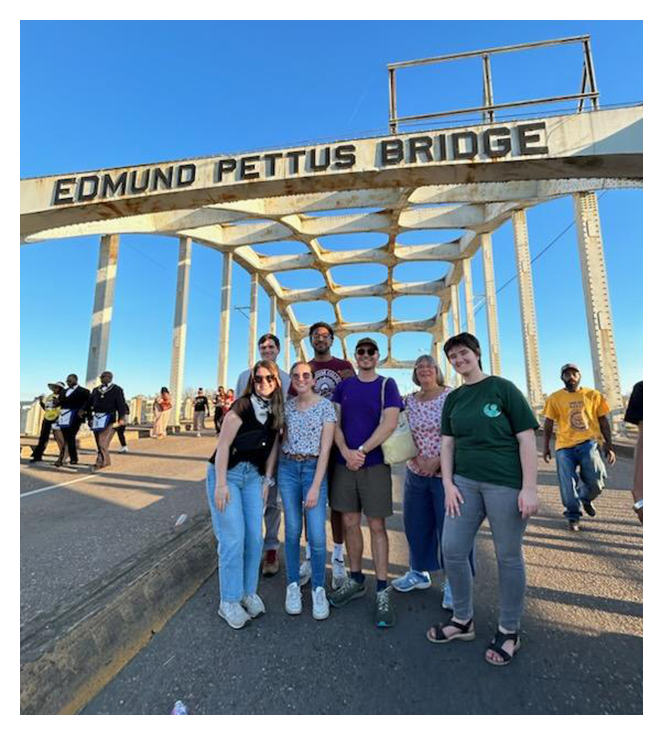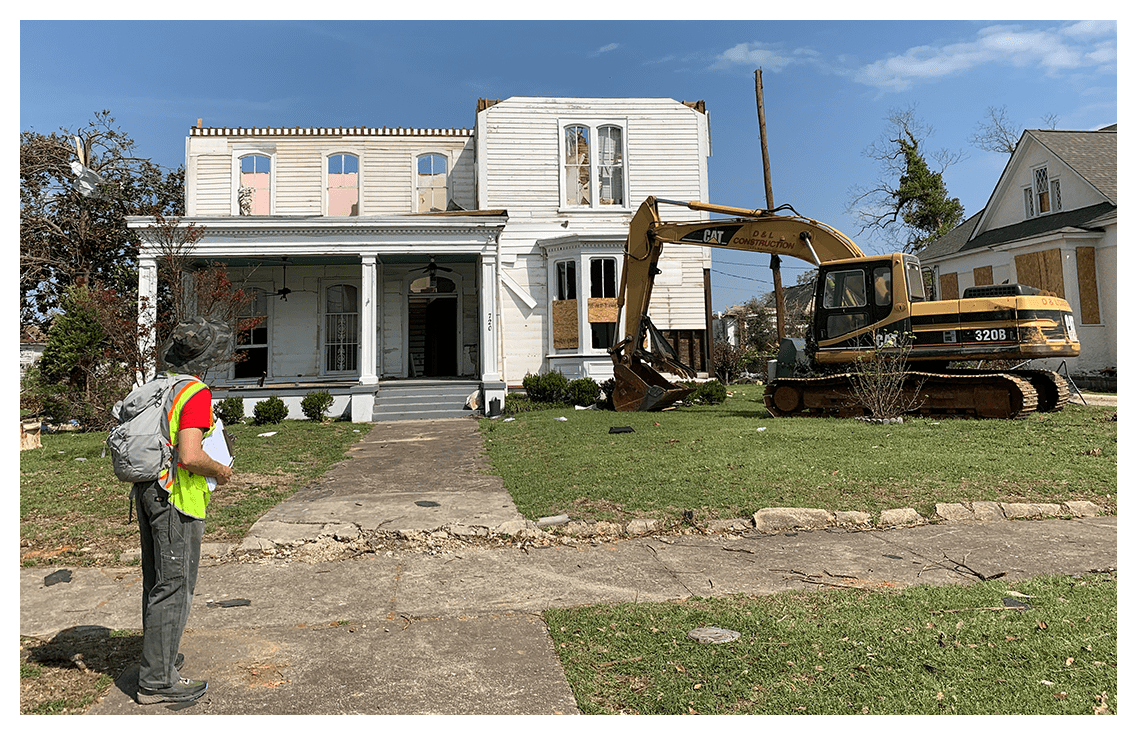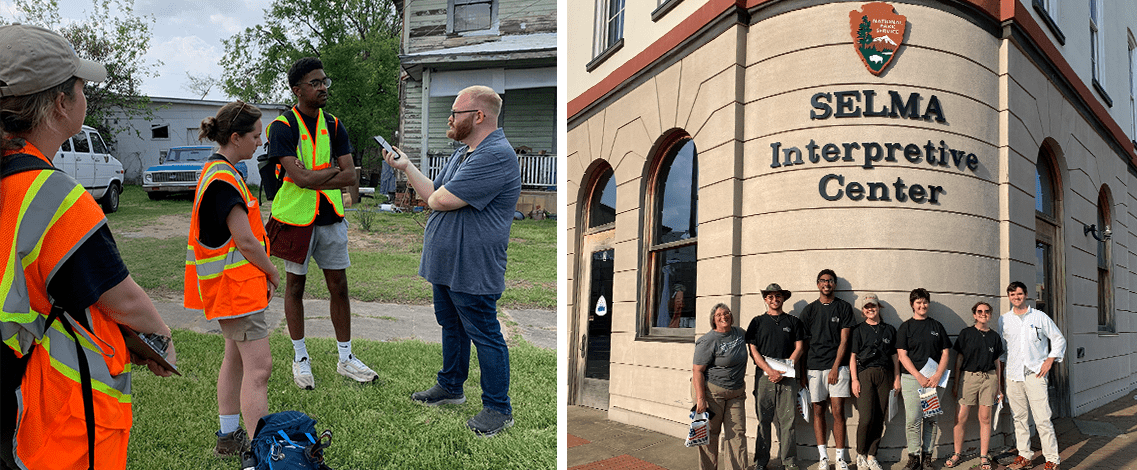MHP students volunteer in Selma, Alabama during Spring Break 2023

During Spring Break, Professor Cari Goetcheus, along with Master of Historic Preservation students Kayla McElreath, Cameron Nesmith, Niamh West, Jeffrey Bussey and Inga Gudmundsson, headed to Selma, Alabama to assist with post-tornado historic resource assessments. An EF2 tornado (110-135 mph winds) cut a path through the middle-northern part of town on January 12, 2023 and caused widespread damage, impacting 2 historic districts as well as numerous adjacent residential and commercial structures. Luckily, there were only 2 injuries.
The 3-day volunteer effort was the result of a conversation between Alex Reinberg (UGA MHP), founder of the non-profit Atlantic Heritage and fellow classmate Professor Cari Goetcheus. Through several conversations, a project plan was quickly crafted and guided on site by Atlantic Heritage co-owner, Ed Barnes.
 Arriving on Sunday afternoon, the group participated in the 58th annual Selma Bridge Crossing Jubilee whose mission is “commemoration and preservation of the spirit of the struggle for
the right to vote in this country and the world.” As a reminder, on March 7, 1965,
a group of about 525 African American demonstrators gathered at Browns Chapel in Selma
to demand the right to vote. They walked six blocks to Broad Street, then across the
Edmund Pettus Bridge, where they were met by more than 50 state troopers and a few
dozen postmen on horseback. When the demonstrators refused to turn back, they were
brutally beaten. At least 17 were hospitalized, and 40 others received treatment for
injuries and the effects of tear gas. The attack, which was broadcast on national
television, caught the attention of millions of Americans, and became a symbol of
the brutal racism of the South. Two weeks later, the Reverend Martin Luther King,
Jr. and 3,200 civil rights protesters marched 49 miles from Selma to the state capital,
Montgomery—an event that prompted Congress to pass the Voting Rights Act soon thereafter.
Arriving on Sunday afternoon, the group participated in the 58th annual Selma Bridge Crossing Jubilee whose mission is “commemoration and preservation of the spirit of the struggle for
the right to vote in this country and the world.” As a reminder, on March 7, 1965,
a group of about 525 African American demonstrators gathered at Browns Chapel in Selma
to demand the right to vote. They walked six blocks to Broad Street, then across the
Edmund Pettus Bridge, where they were met by more than 50 state troopers and a few
dozen postmen on horseback. When the demonstrators refused to turn back, they were
brutally beaten. At least 17 were hospitalized, and 40 others received treatment for
injuries and the effects of tear gas. The attack, which was broadcast on national
television, caught the attention of millions of Americans, and became a symbol of
the brutal racism of the South. Two weeks later, the Reverend Martin Luther King,
Jr. and 3,200 civil rights protesters marched 49 miles from Selma to the state capital,
Montgomery—an event that prompted Congress to pass the Voting Rights Act soon thereafter.
The UGA group took the opportunity to listen to the inspiring words of local, regional, and national dignitaries, including President Biden, then walked across the bridge en masse with hundreds of other Jubilee participants—an emotionally inspiring experience for all.

On Monday morning, the UGA group met with Ed Barnes of Atlantic Heritage and learned how to complete disaster assessment survey forms. The survey data and site photographs will be collated by Atlantic Heritage for potential use by the local historic society, the Alabama State Historic Preservation Office, the local government and even FEMA to help residents rebuild their lives.
With blue skies and temperatures in the 80s, it was perfect weather for doing field survey—albeit hot and sweaty! By the end of the day Tuesday, the small group had completed survey work on 17 blocks assessing 156 residences, businesses, and churches.

Reflecting on the experience, the students noted the following:
“Start to finish, this trip was the most profound experience I have had in my time at UGA. The history of Selma is simultaneously heartbreaking and inspiring. Our time there was short, but I left having grown more as a preservationist than I could have imagined going in, from both the memorializing of the bridge crossing and the tornado survey work. What I learned, the people I talked to, and the work we did will have a lasting impact on me going forward personally and professionally.”
- Jeffrey Bussey, 1st year MHP
“What an experience. Driving into Selma and immediately going to the Bridge Crossing Jubilee set the stage for our survey work. Standing in the crowd, listening to the speeches, and finally walking across the bridge cemented and motivated our group for the work that was to come. While surveying was not for the weak of heart, the more buildings and landscapes we documented, provided us the momentum to keep going. The biggest motivation came from the Selma citizens and homeowners that we interacted with while surveying. Selma is a special place and I feel honored that I was able to help conduct survey work, even if our contributions are only a small blip of the work that needs to be done.”
- Inga Gudmundsson, 1st year MHP
“Although the Selma trip was eventful, inspiring, insightful, and, life changing, the experience was a huge reality check. Through bonding and working diligently with my cohorts to complete our architectural and site survey assessments, I was able to grasp the true impact of what environmental injustice really looks like. Never in my life have I seen the true devastation of a natural disaster on a community; it resonated deeply with me most importantly because the tornado primarily impacted a community of people that mostly looked like me. I am blessed to know how lucky I am to be in the situation that I’m in—a Black graduate student at the University of Georgia. The reality check I received showed me how as a preservationist, it is my duty to serve, protect, fight for, and restore marginalized communities who aren’t receiving the aid from government, state, and local entities that they deserve, largely because of their city's demographic.”
- Cameron NeSmith, 2nd year MHP
“This experience was incredible. Survey work like this rarely feels so impactful and directly helpful. Selma has a fascinating history that I was honored to help preserve and help make the lives of everyone affected just a little bit easier after the tornado. The city itself was lovely, and I am forever grateful that I had the opportunity to go.”
- Niamh West, 2nd year MHP
“I am so grateful to have been able to participate in the post-disaster survey in Selma. I was touched by the personal stories of those affected by the storm, their creativity, and their resilience. It was powerful reminder that while we document historic architecture and sites, the most important work we do is facilitate stories.”
- Kayla McElreath, 2nd year MHP
A huge thanks to Atlantic Heritage for the learning experience, as well as the Morton family of Marion Junction, Selma-Dallas County Historic Preservation Society, Selma City Council, and the Selma community who were all very generous in donating lodging, evening meals, drinks and snacks for the survey work. Big thanks to the CED and MHP program for providing transit to Selma.
While there, the students were interviewed by the Selma Times Journal. You can find their article here.
